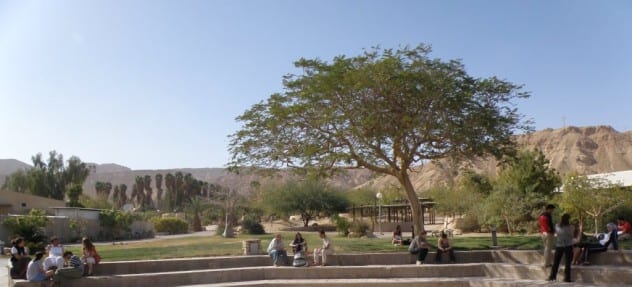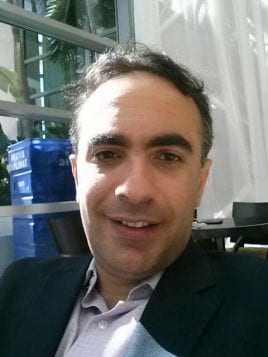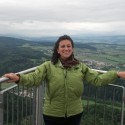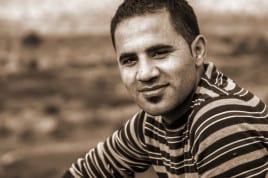
The Arava Institute alumni continue to demonstrate their ability to cooperatively develop and champion innovative solutions to environmental problems by contributing to transboundary research, education, and policy.
Over 1200 graduates of the Arava Institute continue after their studies in creating cross-border environmental projects and promoting initiatives to bridge the political boundaries in the region. Graduates take part in the Arava Alumni Peace and Environmental Network (AAPEN) – an international forum for exchange of ideas that supports the establishment of new environmental initiatives, while providing alumni a strong networking platform for academic and professional development.
The Arava Institute is committed to its graduates who continue their activities as leaders of change and assist them in advising, guiding and funding innovative initiatives. Many alumni projects have received financial support from AIES to enable alumni to pursue environmental and peace-building projects.

Jemie’s cohort of students at the Arava Institute was the last to live in kibbutz housing as opposed to student dorms. When asked about the kibbutz experience, he says, “It was like heaven – life was good,” adding that he liked “the idea that Ketura was close to the borders [with Jordan and Egypt.] Here, there was the possibility to bring people together.” Jemie contributed to this culture of coexistence by bringing classmates home to meet his family. He recalls one weekend when he brought ten classmates to his home in Jordan, including students from Israel, the US, the UK, and Canada. His mother prepared dinner for the group and later they arranged mattresses on the floor so everyone could sleep in the same room.
One of Jemie’s favorite components of the Arava Institute’s academic program was the opportunity to learn more about water management in the Middle East. He remarks that it was interesting to be in the Negev and see how the Israelis were using water resources to make the desert bloom.
Inspired by his semester at the Arava Institute, Jemie enrolled afterwards in the graduate program at the Hebrew University of Jerusalem in Israel to get his first Master’s degree in Politics. In parallel to that, he earned a graduate certificate from the School of International Training in Vermont in Conflict Resolution. Jemie earned his second Master’s degree in Civil Engineering from the University of Birmingham in the UK. In 2007, he earned his PhD in Civil Engineering and Water Resources from the School of Mines and Technology in the United States.
Currently, Jemie lives in Pittsburgh, PA where he works at a private engineering consulting firm as the Managing Principal. He has been involved with the Post Fukushima response to ensure that the U.S nuclear power plants are safe from flooding hazards.
Although over a decade has passed since Jemie’s time at the Arava Institute, his fond memories remain vivid. He says he’ll never forget how “the Arava Institute enhanced my existing perspective on possibilities of strategic development and cooperation in the region to overcome water shortages.”
Alana has been passionate about environmental studies, especially water issues, for years. She received a Bachelor’s degree in Environmental Science and 
Alana notes that living closely with people from so many backgrounds, while enriching, was not without its challenges. But, she says, “No matter how hard it was at times, the Arava Institute is probably the place I feel the most free because of the positive associations I have with it.”
Ahmed studied at the Arava Institute from 2011 until 2012. Ahmed’s time at the Arava Institute opened his eyes to the environmental destruction happening in this region. “There were places around where I live where I could always find gazelles and
Ahmed’s time at the Arava Institute affected more than his view of the environment. “This is a unique opportunity for people from Israel and Palestine to meet people from the other side. I thought [Israelis] were all our enemies, but really it’s the extremists from both sides who are enemies and there are people on both sides who are open.”
Roee attended Arava Institute for Environmental Studies while serving as a member of the International Dead Sea Project, run by the European Union. In this project he was responsible for conducting a comprehensive water budget analysis of the water resources in the vicinity of the lake. Hailing from Levahim, Israel, Roee holds an M.A. in Environmental Studies from Ben Gurion University and a B.A. in Geography and Human Environment from Tel Aviv University.
Currently he is the Associate Vice President of the Israeli Government Company for the Dead Sea Preservation. His primary focus is the planning and implementation of the Dead Sea Project at the company’s headquarters. In his previous occupation, he worked as a Regional Air Monitoring Project Coordinator in the Israel Union for Environmental Defense.
Elizabeth Goldstein was a student at the Arava Institute during the Fall semester of 2008. As an American Jew she sees the need for productive dialogue and understanding from all sides of this conflict, and not just for Israelis and Palestinians, but for their sympathizers as well. Elizabeth is now a second year Rabbinical Student at the Academy for Jewish Religion in Yonkers, NY, and has a rabbinical internship at Temple Beth Emeth v’Or Progressive Shari Zedek in Brooklyn, NY. She posts weekly sermons to her blog, which she started during her semester at AIES.
Itay, originally from Mevasseret Zion outside Jerusalem, studied at the Arava Institute for a year after graduating magna cum laude from Hebrew University with a B.A. in Geography. After being exposed to issues of land use and public policy, Itay enrolled in a Master’s degree in Environmental Studies at York University, Toronto. He received his doctorate in Social Welfare from the University of Pennsylvania in June 2012 and started a position at his alma mater, Hebrew University of Jerusalem, teaching about NGOs, civil society, and social movements in its School of Social Work.
Michael studied at the Arava Institute after receiving his bachelor’s degree in International Relations and Political Economy from Carleton College and a Master of Arts in Law and Diplomacy, with an emphasis in international environment and resources policy, from the Fletcher School of Law and Diplomacy at Tufts University. Currently, Michael serves as Director of Resource Development for Adeso, a nonprofit humanitarian assistance and development NGO based in Nairobi. Michael’s prior experience includes directing the U.S. headquarters of Wildlife Alliance, an international conservation organization. He has, also taken part in conservation and environmental work in the Middle East, Russia, and Southeast Asia.
Raised in Al Hasa, Jordan, Suleiman Halasah was a student at the Arava Institute and then a Program Associate between the years 2006 -2009. He arrived at the Arava Institute after serving as an electrical engineer for the Jordan Valley Authority in the Jordanian Ministry of Water and Irrigation. Suleiman continued his professional work and studies in the field of renewable energy, water, and the environment. Suleiman is the founder of the environmental consulting firm “i.GREENs” and the co-founder of JICCER, the Jordan-Israel Center for Community, Environment & Research at the Arava Institute.
While her transition from the full 08-09 year in the Arava to the fast-paced life of New York City was not easy, Sarah has found ways to work towards the same ideals that flourish at AIES. Sarah is currently in her 4th and final year of studies at Barnard College in New York. She has participated in various community volunteering groups and has taught environmental awareness and science to children in some of the most polluted neighborhoods in the US. As a student of Middle East Studies and Environmental Policy, Sarah is currently beginning research for her undergraduate thesis. Because she finds that the importance of sustainable water consumption and management are more and more obvious as tensions run higher every day, she is proud to be participating in scientific research that could make progress towards a better understanding of the resources available to the Arava and its beloved neighbors.
Dr. Gonen Sagy, an Israeli born on a kibbutz and raised in Zichron Yaakov, is the head coordinator of the Youth Environmental Education Peace Initiative (YEEPI), a program initiated by the Arava Institute to reduce tension and conflict between Jewish and Arab Israeli adolescents in order to advance solutions to common environmental issues. After receiving his BA in education, he studies at the Arava Institute and went on to get his MA from the Jacob Blaustein Institutes for Desert Research at Ben Gurion University. He continued his studies at BGU to receive his PhD, for which he did qualitative research identifying the educational elements that lead to higher levels of environmental literacy.
Desiree holds a Bachelor’s Degree in Environmental Studies from York University in Toronto and completed it at the Arava Institute for Environmental Studies. Desiree, a certified Naturopath, attained her Naturopathic training at the Natural Health Consultants Institute in Montreal and she is currently completing her master’s degree at the Montreal Institute of Classical Homeopathy. Desiree’s in depth Naturopathic training allows her to apply various modalities in treatment such as: holistic coaching, whole food nutrition and supplementation, homeopathy, herbology, traditional Chinese medicine and Ayurveda. In her practice, clients are led to a profound awareness of their thought patterns, habits and lifestyle choices and are empowered to partake in their own healing process. Holistic, whole person care is the underlying philosophy as clients are cared for on all levels including body, mind and spirit.
Maya was an Arava Institute student from 2004-2005 as part of the Arava Institute Masters program with the Jacob Blaustein Institutes for Desert Research at Ben-Gurion University of the Negev, from which she went on to earn her PhD in Environmental Health Policy. Maya was a doctoral fellow of the Environment and Health Fund, and was a Fulbright visiting scholar at UC Berkeley in 2009. Currently, Dr. Maya Negev is director of Environmental Policy at the Hartog School of Government and Policy at Tel Aviv University and a spring-semester lecturer in EcoHealth at the Arava Institute. She also teaches part-time at the Arava Institute. Informed by the relationships she formed with Jordanian students during her time at the Arava Institute, she worked with Professor Alon Tal to draft an environmental chapter for an Israeli-Palestinian initiative published by Friends of the Earth Middle East. She also worked as a research associate at the Van Leer Institute in Jerusalem, in the multiculturalism and public policy group and the environment and regional sustainability group.
Since her aliyah from the United States in 1996, Leiba Chaya has been exploring both the Land of Israel and the Israeli environmental movement. After training as a field guide with the Society for the Protection of Nature in Israel (SPNI), Leiba Chaya came to the Arava Institute from 1997-98 to broaden her background in environmental policy and science. She received her MA in Jewish Education from the Hebrew University. During her time at AIES, she became interested in environmental ethics and place-based education. Leiba Chaya established “Ru’ach HaSviva – Jewish Environmental Initiatives” at the Jerusalem branch of the Society for the Protection of Nature and was one of the founding members of Teva Ivri, a non-profit dedicated to promoting Jewish social-environmental responsibility. She has also worked as an educator and tour guide for a variety of Israel Experience programs.
Noga Shanee studied at AIES in 1999-2000 as part of the undergraduate program and later graduated from Oxford Brookes University, UK, with an MSc in Primate Conservation. She was recently awarded a PhD in Political Ecology at the University of Kent, UK. Noga co-founded Neotropical Primate Conservation in 2007. NPC was set up to promote the conservation of Neotropical forest habitat and all wildlife through various means including land protection, research, law enforcement against wildlife trade, improvement of degraded habitat for wildlife, creation of public awareness, environmental education, and facilitation of the commercialization of sustainable, ecological products on behalf of local people. Noga is the co-director of NPC’s main project, The Yellow Tailed Woolly Monkey Conservation Project in Peru, creating a network of community run reserves to protect Peru’s three endemic primate species.
Eric was a student at the Arava in 2000. Following his studies at the Arava, Eric received his B.A. from UC Berkeley, M.D. from UC Davis and his M.P.H. in environmental health from Harvard University. He is currently completing post-graduate training in environmental and occupational medicine and is a research fellow in environmental health at Harvard University. Eric continues to be involved with the Arava Institute: he participated in the Environmental Leadership Exchange Program, rode in the Israel Ride, and has lectured in both undergraduate and graduate courses at the Arava Institute.
Sarah was a student at AIES in Spring 1999. Upon returning to the United States, she finished her undergraduate degree in Environmental Studies at Allegheny College in 2000 and moved to Ukraine as an Environmental Education Peace Corps Volunteer for two years. After her Peace Corps service, Sarah received her doctorate at the University of Michigan School of Natural Resources and Environment in Environmental Justice and Conflict Management and completed a postdoctoral fellowship in environmental human rights at Colby College. She is currently Assistant Professor of Environmental Studies and Director of the Center for Teaching and Learning at Centre College in Danville, Kentucky. Her environmental teaching and research is designed to enable nonprofit organizations, community groups, and government agencies to create and implement more productive and equitable conflict management processes in environmental justice situations.
Muhanad was a student and intern at the Arava Institute between the years 2012-2013. Muhanad has an undergraduate degree in Civil Engineering from An-Najah National University. In 2013, he worked as a Water Project Manager for Comet-ME, an Israeli-Palestinian organization that specializes in rural electrification and projects that provide water to marginalized communities in Area C of the West Bank. In 2014, Muhanad was awarded a Fulbright Scholarship to pursue his Master’s degree in Policy and Economics of Freshwater Resources at the University of Wisconsin-Milwaukee. During his studies, he joined the student chapter of “Engineers Without Borders” on a trip to Guatemala to provide the Mayan community of San Pedro with a sustainable water system. In 2018, Muhanad co-founded WATA Solution as a Palestinian-Israeli startup that provides Palestinian households with on-demand access to their personal water consumption data.
Zubaida, originally from Akka, was a student at the Arava Institute in spring 2013 and a Program Associate in fall 2014. She was the coordinator of a greywater system implementation project in Negev Bedouin communities for the Center for Transboundary Water Management at the Arava Institute. Zubaida has a Master of Public Health (MPH) degree from Haifa University, and is pursuing a doctorate in the Faculty of Health Sciences in the Department of Health Systems Management, Ben-Gurion University. Zubaida has completed the Wahat A’Salaam/Neve Shalom training course to facilitate dialogue groups of Israelis and Palestinians and has worked extensively translating between participants in such programs.
Mohammad Azraq was born to Palestinian parents in Kuwait City, Kuwait. Following his year at the Arava Institute, he was awarded the Atkin Fellowship for Arab Israeli Peace by the War Studies Department of King’s College London, where he published a paper on grassroots community initiatives for renewable energy generation in West Bank villages. Mohammad is currently developing a platform with three other alumni of the Arava Institute that aims to bring together Mizrahi Jews, Arab and other young creative entrepreneurs of Middle Eastern descent who now live to Europe to create joint projects together.
Rina is an environmental peacebuilder and entrepreneur who has been developing and directing cooperation projects with Palestinians, Israelis, and Jordanians for the past seventeen years. Her work is guided by a wholesome perspective including social-economic and environmental wellbeing of communities, and tangible, hands-on and long-term peace building opportunities. Rina holds a master’s degree in International Community Development from Hebrew University. She is currently working on her PhD in community development and transboundary environmental cooperation in the Department of Geography and Environment at the Hebrew University. Rina co-directs the Jordan Israel Center for Community Environment and Research (JICCER) at the Arava Institute with Suleiman Halasah. She also manages cooperations with Jordan on behalf of the Dead Sea and Arava Science Center and the Eilot Regional Council.
Born in Israel to a Libyan father, Liel wondered about his identity and its meaning in the Middle East all his life. Since 2015, Liel co-directs the Israel/Palestine Center for Regional Initiatives (IPCRI), a shared organization of Palestinians and Israelis focused on forming professional partnerships across lines of conflict and policy impact. Liel has worked with the American Congress and State Department, European delegations, and leading think tanks, as well as community-based organizations.
Liel also lectures in various capacities and serves on the board of The Peace NGO Forum, Middle East Institute, and New Story Leadership. In addition, he partners with AIES in leading the Track II Young Professional Forum. Liel holds a M.A in International Development and B.A in Political Science and Middle East Studies, both from the Hebrew University of Jerusalem.
